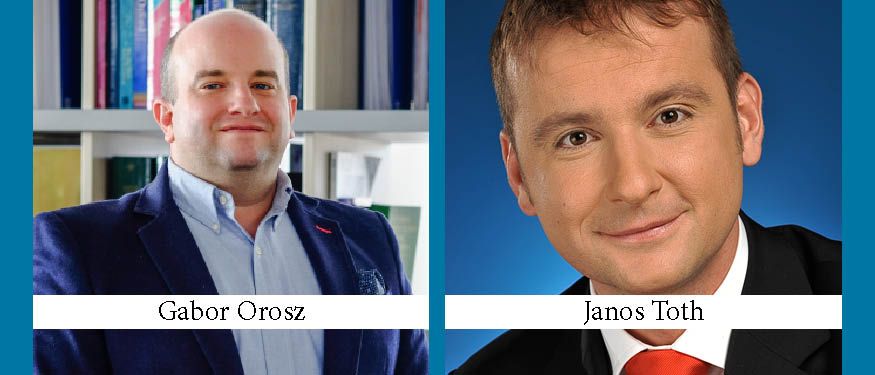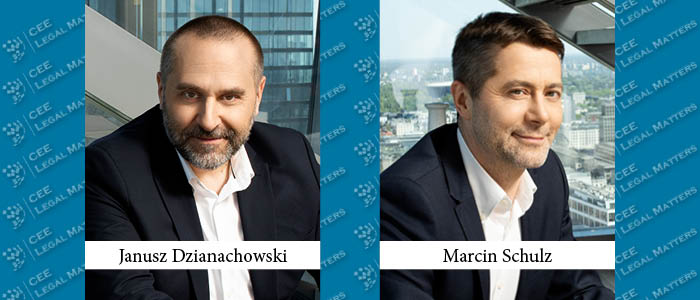Wolf Theiss Budapest Partner Janos Toth Interviews Gabor Orosz, Associate General Counsel and Legal Director EMEIA of National Instruments Corporation.
J.T.: As the Associate General Counsel of National Instruments Corporation you are in charge of legal affairs for Europe, Middle East, Africa, and India. How would you define your role, what are the main challenges posed by your role, and what do you enjoy the most?
G.O.: For the last 15 years, it has been a remarkable experience to serve National Instruments (NI), starting as an outside counsel for Hungary, then quickly joining the in-house team in Austin, Texas, to work closely with our General Counsel, David Hugley as my mentor, and prepare for a broader role of overseeing our legal matters for all of Europe. After two years in the US and in the UK, I was able to return to Hungary as European Legal Director and start building the legal team that is currently in charge of supporting over 40 NI entities in the EMEIA region as well looking after legal affairs in countries where we work with resellers. There was about a year-long period where I was asked to manage our legal issues for Japan, Korea, and Hong Kong as well, which was quite an experience.
We manage the full range of practice areas, from commercial and licensing matters through M&A, all the way to various aspects of legal compliance, with many topics in between.
I feel truly fortunate to have a world-class in-house team to work with in Hungary, which is certainly not a standard setup for a US public company. Most of the senior colleagues have around a decade of NI tenure, so we have a solid and highly engaged department, with significant knowledge and understanding in terms of the business and strategy of the company.
I wouldn’t particularly call out any specific challenge and will say that as long as you view this job as an exciting framework for being able to attend to matters in so many cultures and work with people from a variety of backgrounds, every day will carry its own unique learning opportunities.
J.T.: I understand that you have a competent legal team of three lawyers at your Hungarian headquarters. What kind of legal work do you tend to carry out in-house and what matters do you prefer to hand out to external counsel?
G.O.: We would be nowhere without a highly capable network of outside counsels in the countries we cover, most of whom have been working with NI for between 10 and 15 years, with several of them for over two decades. We are often subject to jokes suggesting we should be bringing in more litigation work, but the reality is that we tend to have a good track record of avoiding litigation to the extent possible. The in-house team primarily supports the vast majority of our commercial activities, and we will mostly turn to outside counsel when local legal knowledge and/or a license I,s required. Typical areas include regulatory matters, labor and employment, and real estate transactions, and we always involve external counsel for M&A type work.
J.T.: Who is the decision-maker in selecting an external counsel and what are the criteria in selecting the firms you will be working with? What tools do you use to learn more about their capabilities?
G.O.: For the region, I am usually in the position of making the decision on the choice of outside counsel. We always try to carry out a fair amount of research before staring an interviewing process in a given country and we identify a short list. The criteria really depend on whether we are looking for a firm to support us with a full range of day-to-day matters or whether we have a specific assignment and will look for some niche expertise. In the first case, a key consideration is that we gain confidence in the firm’s ability to provide us with everything needed at a high quality level, with proper attention and turnaround times and at a competitive price, of course, with a partner and a senior associate dedicated to the NI account who familiarize themselves with our business and products. In the second case, we will go for the strongest firm we can find for a certain topical area. In any case, we are one of those “old school” clients where personal impressions still matter more than simply looking at the brand name of the firm.
In terms of assessing a firm’s capabilities, we will reach out to existing external counsels and see if they can give us any referrals. We will also look at rankings from the usual sources and will check out the websites of the firms we would interview. In almost all cases we would travel to the specific country and carry out a thorough interview process before coming to a decision. You can probably tell that outside counsel selection is something not taken lightly at National Instruments, which has always been a matter of principle for our GC and also one of the first things I had learned from him when he first hired me as an outside counsel.
J.T.: When you rely on external counsel, do you have a panel of law firms you work with or do you pick them on a case-by-case basis? Do you prefer to use the same law firm in different jurisdictions and/or different mandates?
G.O.: Once we have picked a firm, we tend to be very loyal clients on the long run. Unless there is a matter that clearly requires unique expertise, we would largely stick with a “one-stop-shop” concept. What has proven to be the case several times is that our general firm would actually refer us to the appropriate expert even outside their offices, should we face a situation where we need some additional knowledge and experience.
There are some exceptions, primarily in countries where NI has more sizeable operations, where we would by default work with a panel of firms due to higher complexity levels. We also have a couple of firms that we would work with for EU scale regulatory projects in areas such as data protection, customs and export compliance, etc.
I can only think of one example, where for several years now, we have been using one firm, very successfully by the way, for multiple jurisdictions in South-East Europe.
J.T.: What do you expect from a law firm? Beyond those elementary requirements that it “understands your business and the sector needs,” are there specific criteria a potential law firm should prove to meet your expectations?
G.O.: Obviously, expertise and experience will matter the most as well as having an interest in attracting NI as a high-tech client. We are a company with an employee-friendly culture regularly ranked among the best places to work in multiple countries based on various survey formats. It is therefore also important for us to find a firm whose values tie in nicely with ours, primarily around respecting the individual. Very often, even in the first interview, I would ask the partners giving us their pitch if it was possible to have a tour of the offices where the lawyers work and also have the opportunity to meet the associates who would be assigned to our account.
We also place an emphasis on the fee structure and, as many other companies, are looking at ways to keep legal spend at rational levels, without compromising on quality.
J.T.: How can a law firm make the cooperation with NI more efficient and effective?
G.O.: I would put a little twist on the answer for this question in that we strongly believe that, as clients, we shouldn’t only set expectations to the firms we work with in terms of alignment and always meeting our requirements, but prefer to actively work together, taking the time to explain business rationales behind decisions and putting assignments in strategic perspective. This really helps with building a trust-based and more personal relationship.
Seven years ago we launched an initiative where every other year we would invite the in-charge partners from all the firms we work with in Europe to Budapest and spend two and a half days together in a conference setting discussing NI-specific legal topics, but also invite a couple of our executives to talk about the business, new product offerings, and application use cases. We also arrange some cultural and team building activities that are always a lot of fun. That firms commit their partner time to this event is always a positive for us – and we always receive exceptional feedback on how valuable these occasions are for outside counsels as well, not only from a client=relations perspective but also in terms of NI facilitating a valuable networking event for these colleagues from different parts of Europe. Next time we plan to invite external counsels from the Middle East, Africa, and India as well, which promises to be an even more interesting mix of colleagues from various legal backgrounds.
J.T.: What source/media do you prefer regarding the receipt of updates on legal issues, legislative changes, regulatory developments etc.? Do you prefer face-to-face meetings (business breakfast/conferences/tailor-made in-house trainings) or electronic sources (newsletters, webinars, etc.)?
G.O.: I really value all of the above and, if done at the right quality level, find these methods the most credible marketing tools for any serious firm. I wish I had more time to attend face-to-face events, but the reality is that it is more likely that I will read through a newsletter. I also encourage my colleagues to attend webinars falling within their areas of practice.
J.T.: What kind of legal/regulatory challenges does a US-based company face in our CEE region?
G.O.: I would say we probably need to be proactive and vigilant around topics that are similar to any other company in the B2B technology sector, namely environmental compliance, data privacy, labor law requirements, competition, and anti-bribery legislation, just to call out a few. I would not say that the CEE region is any more challenging for us than any other region of Europe.
J.T.: And finally allow me a personal one: if you had the opportunity tomorrow to start life afresh, would you pick the profession of lawyer again?
G.O.: Good question. Let me start with saying that my wife, who is also a lawyer, and I already encourage our children (ages seven and ten) to keep an open mind about becoming engineers, doctors, teachers, or even musicians, and not necessarily lawyers. At the same time, if I were to decide again, I would likely become a lawyer again in a heartbeat … it is a rewarding profession to have if you feel you can make a small positive difference around yourself day-by-day.
This Article was originally published in Issue 4.2 of the CEE Legal Matters Magazine. If you would like to receive a hard copy of the magazine, you can subscribe here.





























